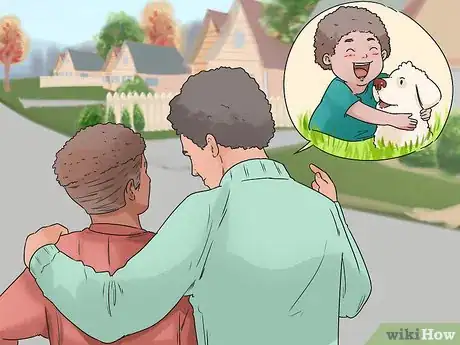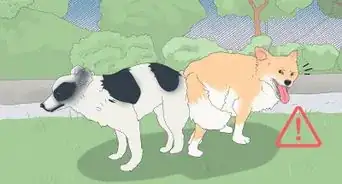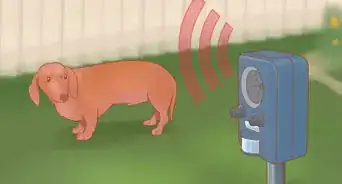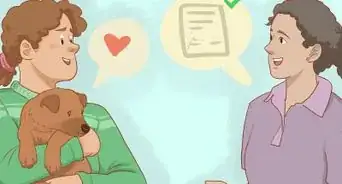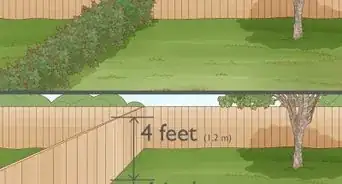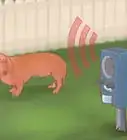This article was co-authored by William Gardner, PsyD. William Gardner, Psy.D. is a Clinical Psychologist in private practice located in San Francisco, CA’s financial district. With over 10 years of clinical experience, Dr. Gardner provides individually tailored psychotherapy for adults using cognitive behavioral techniques, to reduce symptoms and improve overall functioning. Dr. Gardner earned his PsyD from Stanford University in 2009, specializing in evidence-based practices. He then completed a post-doc fellowship at Kaiser Permanente.
There are 15 references cited in this article, which can be found at the bottom of the page.
This article has been viewed 25,691 times.
The loss of a beloved family dog is never easy, and children may struggle to understand what happened to their canine companion. While you may want to protect your child from death, it is better to be upfront but gentle about their dog's passing. Be honest with them. Let them express their emotions freely in a safe and protected environment, and encourage them to memorialize their dog through therapeutic practices. By doing this, you can teach kids how to mourn in a healthy, supported manner.
Steps
Telling the Child About Their Dog’s Death
-
1Prepare your child beforehand if you can. If you know the dog will die soon, start gently preparing the child through indirect means, like books or movies. Look online for some that handle these concepts, and make sure to get one made for the child’s age group. You can also ask a friend, librarian or bookstore employee for suggestions.
- The child will identify with the characters and understand that the characters’ feelings of grief are normal. This will help them while they emotionally process and mourn the dog’s death.
-
2Choose a good time. While you may want to tell the child as soon as you know about the death, you should wait for an appropriate time. Do not tell the child about the dog’s death right before they have to go to school or to bed. This may cause them to have trouble concentrating or sleeping.[1] After they return home from school is a good time to tell them.
- If you know in advance that the dog is dying or that you will need to euthanize the dog, you can start the talk early. You can say, “Roger is very old and sick. The vets did everything they could, and now we have to say goodbye. This is the nicest thing that we can do for him. He will die peacefully and without pain.”[2]
Advertisement -
3Tell your child that the dog has died. Use direct language. Tell your child that the dog is dead. Do not use euphemisms like “Bailey went to sleep” or “Macy is now in heaven.” Young children often take these very literally, and it may scare or confuse them.[3]
- You can say, “We have very sad news. Daisy died today.”
- Avoid telling your child that the dog ran away. This may confuse them, and they may expect the dog to return.[4]
-
4Explain death. The death of a family dog may be the first time the child has lost someone in their life. Your child may not understand that their dog is gone forever. This may be a good opportunity to teach children about death and mourning in a healthy, protected environment.
- You should explain that death is natural. You can say, “All animals eventually pass away. The important thing is that we remember our loved ones, and we keep them in our hearts forever.”
- They may ask you what death is. It may be easiest to describe it by saying that the body stops working. You can say “Death is when you stop breathing, and your heart stops beating. Max can’t walk or run, eat, sleep, or see anymore. But the good part is that he can’t feel pain anymore, either.”
- Some children may not understand that death is permanent or final. You might tell them, “Death is natural, and it lasts forever. Max may not return to us, but that does not mean we have to forget him.” Over time, your child will come to understand death.
-
5Answer their questions. Your child may have many questions about what death is or where their beloved dog went. Patiently answer these questions. Keep in mind that their questioning may not occur all at once; they may have many questions over a period of days.
- If your child asks what will happen to the dog’s body, you can say, “We are going to have Max cremated. This means that his body will be turned into ashes. Don’t worry. He can’t feel pain anymore.” You can also say,“We’re going to bury Lulu in the backyard.” Avoid using words like “burn” or “fire.”[5]
- If your child asks what happens to the dog after death, you can take the opportunity to explain any beliefs about the afterlife that you may hold. You can also say “I don’t know” if you're not sure about the afterlife. You can even state that although the dog is no longer with you, they will always live in your happy memories of them.[6]
- If your child asks if they are going to die or if you are going to die, you can tell them, “It’s not likely to happen for a long time.”[7]
-
6Consider what is appropriate to tell your child. What and how you tell your child can depend on their age, maturity, and relationship with the dog. Think about how much your child is capable of understanding and how they might react to the news.[8] Young children may not understand what is going on, but they should still be told that the dog has died. Older children may be able to handle the news better, but they may also begin to act out as part of their grief.
- If the dog was killed in an accident, you should be careful with what details you tell your children. Younger children may become scared or anxious if you tell them that the dog was hit by a car or attacked by another dog. Instead, you can say, “Sparky died today. It was very sudden.”
- Older children may be able to handle the idea that their dog was killed in an accident, but you should only inform them about the cause of death, not any of the particular details. For example, you can say “There was an accident. Lulu was hit by a car, and unfortunately, she did not survive.” In this case you should emphasize that no one was at fault. You can say, “It was an accident. We’re not blaming anyone for it.”
-
7Let preschool-aged children process slowly. Younger children often process grief in small chunks and might wait to grieve until they feel it’s safe to do so, taking comfort in their normal routines. Give them lots of hugs and attention while they go through this process.
Consoling Your Child
-
1Ask them how they feel.[9] The child may not immediately express their emotions. Gently ask them how they are feeling. Encourage them to put their exact feelings into words, so that they can learn how to process their emotions.
- You can say, “I know that this must be hard for you. How are you feeling? Can you tell me?”
- Your child may state that they are sad or upset. You can respond by saying, “I’m sad too.”
- It is normal for children to blame themselves for the dog’s death, even if they had nothing to do with it. They might also express resentment against you or the vet for not saving your dog.[10] You might tell your child, “You had nothing to do with Skipper’s death. His body just stopped working. There is nothing that any of us could have done.”
-
2Use art therapy to help your child express themselves. It can be hard for children to know how to put feelings into words, particularly intense and possibly new emotions like grief. Give them a piece of paper and encourage them to draw whatever they feel like. Don’t force them to talk about their drawings with you; simply let them express themselves and talk to you when they want to.[11]
- With younger children, set out a coloring book and some crayons. Color together for a little while and talk about your drawings together.
-
3Express your own grief. You should not feel as though you have to hold in all of your own grief. Showing your own reaction to death can demonstrate to your child that mourning is natural.[12] It can also teach them how to grieve in a healthy manner.[13]
- You can tell your child what emotions you feel. You could say, “I feel sad too. I’m going to miss Gigi so much. It makes me hurt inside too.”
- Don’t be afraid to cry in front of your child. This can show them that crying is a normal reaction and that they should not be ashamed of crying after a loved one has died.
- If your grief is making it difficult for you to complete daily tasks or if you cannot stop crying, you should find a confidante or consult a doctor.[14]
-
4Share stories about your childhood pets. A good way to comfort your child is to tell them stories about your childhood pets. You might even include how you felt when they passed away. This will distract your child from their grief while teaching them that death is a normal part of life.[15]
- Another option is to ask your child what their favorite story about their dog is. You can share yours as well.
-
5Play with your child. Children often work through their grief by playing. You can play with them to make sure that they are handling the loss of their dog well. As you play, you may notice that young children will incorporate death into their play. This is natural, and it is part of the grieving process for them. You might try to guide these plays towards a productive and healthy understanding of death.
- For example, if they are giving a doll a funeral, you might make sure that they understand what a funeral is.
-
6Allow your child grieve in their own way.[16] Some children may ask you a barrage of questions while others will sit in silence. Some will cry while others will want to play. These are all ways that children cope with death. Give your child room to grieve their own way. You should comfort them when they come to you in grief, but you should not force them to talk if they don’t want to. They may be dealing with the death in their own way.[17]
- If your child wants space while they grieve, you should give it to them. They may not want to join in activities such as a funeral, memorial, or family discussions. Do not force them to participate unless they want to.
Providing Your Child with Closure
-
1Hold a funeral. A funeral or memorial service will provide much-needed closure to the child. You can ask the child to help you plan the funeral. At the funeral, everyone can share their favorite story of the dog. The child can then help you spread the ashes or bury the remains.[18]
- If you are religious, you can ask the child to help you write or find a prayer for the dog.
- If you have multiple children, each should have their own part in the funeral. Perhaps one can bring flowers, one can sing a song, and one can carry the urn.
-
2Ask them to create a memorial. Creative activities can help your child process emotions, and a pet memorial will give them something concrete to remember their dog by. There are many different types of memorials that your child can create for their dog.[19] These include:
- A scrapbook of all of their memories with their dog
- A drawing of their dog that you can hang on their wall
- A letter to their dog
- A plaster paw print or bone with the dog’s name
- A shadowbox filled with the dog’s pictures, toys, or collar
- A story about the dog as written by the child
-
3Keep a normal routine. The death of a beloved dog can be a major disruption in your child’s life. It is important during this time that they have a familiar routine and structure in the household. This will teach the children that life goes on despite death, and it will help them return to a sense of normalcy more quickly.[20]
- This is probably not the best time to take a family vacation.
- In most cases, you should probably not let a child miss school because they are grieving for the dog. If the child is inconsolable or traumatized, however, you might consider staying home with them for a day.
- If you find that your own grief is too strong, you might ask a friend, spouse, or family member to help out with the children for a while so that you have your own space to grieve.
-
4Wait before you get a new pet. A new dog will not replace the old one. Every dog has their own personality and characteristics, even if they are the same breed as your old dog. Give your entire family time to mourn your dog. Make sure that you do not rush into adopting a new dog until you are absolutely ready.[21]
- Your children may start asking when you will get a new dog. You can say, “We will adopt a new dog in the future, but now is not the right time.”
Expert Q&A
-
QuestionHow can I get over grief after my dog passes away?
 William Gardner, PsyDWilliam Gardner, Psy.D. is a Clinical Psychologist in private practice located in San Francisco, CA’s financial district. With over 10 years of clinical experience, Dr. Gardner provides individually tailored psychotherapy for adults using cognitive behavioral techniques, to reduce symptoms and improve overall functioning. Dr. Gardner earned his PsyD from Stanford University in 2009, specializing in evidence-based practices. He then completed a post-doc fellowship at Kaiser Permanente.
William Gardner, PsyDWilliam Gardner, Psy.D. is a Clinical Psychologist in private practice located in San Francisco, CA’s financial district. With over 10 years of clinical experience, Dr. Gardner provides individually tailored psychotherapy for adults using cognitive behavioral techniques, to reduce symptoms and improve overall functioning. Dr. Gardner earned his PsyD from Stanford University in 2009, specializing in evidence-based practices. He then completed a post-doc fellowship at Kaiser Permanente.
Clinical Psychologist It can take a little bit of time to overcome all of your feelings. Allow yourself time to process your grief on your own time. Don't feel rushed since everyone handles grief differently.
It can take a little bit of time to overcome all of your feelings. Allow yourself time to process your grief on your own time. Don't feel rushed since everyone handles grief differently.
Warnings
- If the child is acting out at school, you may want to sit them down for another talk to make sure that they have the support they need.⧼thumbs_response⧽
- If your child’s grief lasts for a long time or if you notice uncontrollable fits of grief, you may want to consult a child psychiatrist. Your child may have adjustment disorder.[22]⧼thumbs_response⧽
References
- ↑ http://msue.anr.msu.edu/news/talking_with_children_about_the_death_of_pets
- ↑ http://kidshealth.org/en/parents/pet-death.html
- ↑ http://childmind.org/article/helping-children-deal-grief/
- ↑ http://www.humanesociety.org/animals/resources/tips/coping_with_pet_death.html
- ↑ https://vet.osu.edu/vmc/sites/default/files/import/assets/pdf/hospital/companionAnimals/HonoringtheBond/HelpingChildrenCopeFactSheet.pdf
- ↑ http://childmind.org/article/helping-children-deal-grief/
- ↑ http://www.helpguide.org/articles/grief-loss/coping-with-pet-loss.htm#children
- ↑ http://childmind.org/article/helping-children-deal-grief/
- ↑ William Gardner, PsyD. Clinical Psychologist. Expert Interview. 25 July 2019.
- ↑ http://www.humanesociety.org/animals/resources/tips/coping_with_pet_death.html
- ↑ https://www.psychologytoday.com/blog/arts-and-health/201601/child-art-therapy-how-it-works
- ↑ William Gardner, PsyD. Clinical Psychologist. Expert Interview. 25 July 2019.
- ↑ https://vet.osu.edu/vmc/sites/default/files/import/assets/pdf/hospital/companionAnimals/HonoringtheBond/HelpingChildrenCopeFactSheet.pdf
- ↑ http://childmind.org/article/helping-children-deal-grief/
- ↑ http://kidshealth.org/en/parents/pet-death.html
- ↑ William Gardner, PsyD. Clinical Psychologist. Expert Interview. 25 July 2019.
- ↑ https://vet.osu.edu/vmc/sites/default/files/import/assets/pdf/hospital/companionAnimals/HonoringtheBond/HelpingChildrenCopeFactSheet.pdf
- ↑ http://childmind.org/article/helping-children-deal-grief/
- ↑ http://csu-cvmbs.colostate.edu/vth/diagnostic-and-support/argus/Pages/involving-children.aspx
- ↑ http://childmind.org/article/helping-children-deal-grief/
- ↑ http://childmind.org/article/helping-children-deal-grief/
- ↑ http://childmind.org/article/helping-children-deal-grief/








